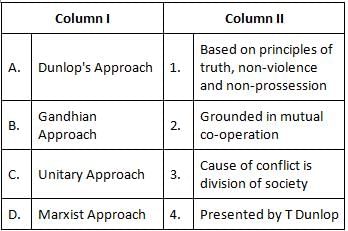UGC NET Paper 2 Sociology Mock Test - 6 - UGC NET MCQ
30 Questions MCQ Test - UGC NET Paper 2 Sociology Mock Test - 6
In which of the following books C.H. Cooley introduced the concept of ‘primary group’ characterized by intimate face to face association?
Around the world, neo-liberalism has been imposed by powerful financial institutions. Which of the following is one of such institutions?
Which two statements correctly describe the contributions of Karl Marx and Friedrich Engels with regard to socialism?
I. They co-authored "The Communist Manifesto" in 1848.
II. They emphasized the importance of a market-driven economy.
Identify the correct answer based on the following statements:
Statement 1: Neoliberal perspectives argue for limited state intervention in the economy, emphasizing free-market principles and deregulation.
Statement 2: Feminist critiques of the state highlight its role in perpetuating gender-based oppression and call for transformative changes to address systemic inequalities.
Statement 3: Postcolonial theorists contend that the state, often shaped by colonial legacies, can contribute to the marginalization of certain groups and advocate for decolonization.
Statement 4: Techno-optimists propose that advancements in technology will render the traditional functions of the state obsolete, leading to a more decentralized and autonomous societal organization.
Which of the following is a feature of a Socialist State?
(1) Individualism
(2) Collectivization of agriculture
(3) Movement of products and exchanges determined by the market
Which of the following is an example of rationalization?
Who has written the book 'The Origin of Family, Private Property and the State'?
Direction: In the question given below are two statements labelled as Assertion (A) and Reason (R). In the context of the two statements, which one of the following is correct?
Assertion (A): Natural disasters fall at unexpected and speedy pace.
Reason (R): Today humans are unappropriatley harnessing nature.
Which among the following factors were as an agent of socialisation process?
Assertion (A): Leadership is a personality trait.
Reason (R): It is a way of relating oneself to others.
The three-tier system of Panchayati Raj was recommended by
For a tribal of a particular region, Ghotul represents:
Deconstruction is a popular method of research in:
________ culture refers to the intangible elements of culture.
Which one of the following refers to an individual whose behaviour in a particular role provides a pattern upon which another individual base his behaviour in performing the same role?
A hypothesis that suggests no relationship among the variables selected under study is called
In order to promote the development of science and technology under a new policy on education, what step was taken up?
In which continent scientists have found particles of a rare isotope of Iron?
What is the name of the exhibition, organised by the Ministry of Textiles, for promoting Geographical Indication (GI) crafts?
Which of the following is not identified as a new form of the community?
What are the structural dynamics of society?















